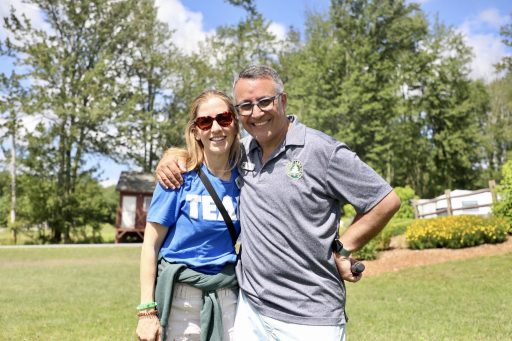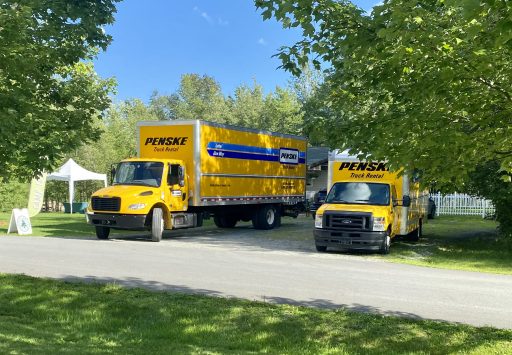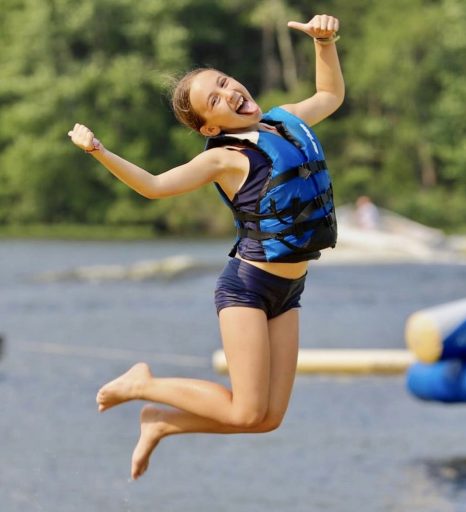By Aaron Selkow, Owner/Director
This post is adapted from a piece by Aaron oringally published in Camping Magazine
For 30 years, I have been a camp professional. Most of that time, I owned, directed, led, or supported summer camps. For the few years in between my three camp directing positions, my jobs shifted to more global roles with a couple of very large nonprofit youth-serving organizations. But I have always kept my head and heart in the camp world. I have in some way — whether directly or indirectly — impacted the experiences of more than 300,000 campers and staff members during my summers as a camp leader. I’ve learned from legends and innovators, have been exposed to exceptional training and professional development, and consider myself to be fortunate for the assistance and investment others have made in my career. As I look back at my life as a camp person and assess the skills that I have seen grow and become refined, here are the things that I think qualify as my strengths that may be at an objectively expert level:
- I can make excellent forms.
- I can talk for a very long time.
- I can get people to do things they don’t want to do and make them believe that they did want to do them.
- I can spin a basketball on my finger.
Camp directors tend to think their profession is unique. We’re not like traditional educators because we run immersive and extremely intensive programs. We’re not like typical business owners because we act in loco parentis and hold the lives of children in our hands. We’re not like cruise ship captains because . . . well, maybe we are like cruise ship captains. While our peers may do other interesting things, we tend to feel that camp is a specialized field that requires distinct expertise and that others may not understand what it takes to succeed. It might be true that the nuances need a bit of explaining at cocktail parties, but I believe the essence of how we thrive in our field may not be as dissimilar as it appears if we look through the lens of skill acquisition. In a way, we are just like anyone else working day after day in a position that tests their ability to learn and develop skills. Skills are the tools that we use to do our jobs.
 And camp leadership does test and expand your skill set. I have learned how to clean the inside of a 100,000-gallon underground reservoir, how to replace a large-amp breaker, how to snake a wastewater line, how to repair a pitched roof, how to stop water from flooding a building (and how to clean up after you’ve failed), how to pour concrete, and how to pull a submersible well pump that’s 300 feet below ground. I have learned enough Hebrew to order rugelach at the shuk (open-air market in Israel), enough about architecture to help design a building, enough chords to play guitar in front of indiscriminating crowds, enough HTML to build (and occasionally crash) a website, enough about how to operate deep fryers, convection ovens, and commercial dishwashers to work the line, enough about medicine to know the difference between Coxsackie and Hand-Foot-and-Mouth (same thing, actually), and enough about copier machines to solve almost every jam I’ve caused.
And camp leadership does test and expand your skill set. I have learned how to clean the inside of a 100,000-gallon underground reservoir, how to replace a large-amp breaker, how to snake a wastewater line, how to repair a pitched roof, how to stop water from flooding a building (and how to clean up after you’ve failed), how to pour concrete, and how to pull a submersible well pump that’s 300 feet below ground. I have learned enough Hebrew to order rugelach at the shuk (open-air market in Israel), enough about architecture to help design a building, enough chords to play guitar in front of indiscriminating crowds, enough HTML to build (and occasionally crash) a website, enough about how to operate deep fryers, convection ovens, and commercial dishwashers to work the line, enough about medicine to know the difference between Coxsackie and Hand-Foot-and-Mouth (same thing, actually), and enough about copier machines to solve almost every jam I’ve caused.
Ask me to set up an auto attendant in your phone system, an auto-reply in your email, a marriage ceremony, a system for tracking attendance and retention, a table for a promotional event, or a 12-team double-elimination round-robin tournament, and you will get results. But are these skills? Are these legitimate talents that I possess, or simply a result of the panoply of experiences that a camp director may have while trying to navigate the unpredictable and varied crises they face over their career? These abilities may exemplify the master-of-none mystique that camp directing emits; a job where a pair of flip-flops can pass as appropriate as long as your shirt has a camp logo on it.
Reading Malcolm Gladwell’s Outliers began my quest to better understand how I might turn these tidbits of knowledge into real skills. I completed the book still considering which proficiencies I should prioritize to become an expert in. Gladwell’s 10,000 Hours Rule, which states that this many hours of “deliberate practice” are needed to become world-class in any field, felt overwhelming (Gladwell, 2008).
When Princeton University released its own study in 2014 that debunked the deliberate practice quotient put forth by Gladwell, I was momentarily excited. Surely, they had realized that exceptional skill could be reached in far less time. But instead, the researchers presented data to show that 10,000 hours of practice was not nearly enough. Their meta-analysis of 88 studies related to deliberate practice showed that in some domains, the time and effort put into practice might account for only a 12-percent difference in performance (MacNamara, Hambrick, & Oswald, 2014). In less stable fields — and camping would have to be considered one due to the changes in rules, context, and audience — mastery relies less on what one can predictably prepare for and more so on other variables. Hopelessness gave way to hope when I started to think about the difference between virtuoso (which Gladwell uses as a standard of excellence) and winner. I can accept that I may not appear in the annals of camping history as an all-time great, but is the reputation as a successful professional a reasonable goal?
My career in camp has had natural separations between my first 14 years as a professional at Pinemere Camp, my 9 years leading Camp Harlam and helping to support the URJ Camping System, and the last few years as an owner/director with my incredible wife, Ann, at Chestnut Lake Camp. In the first stage, I was pretty sure I knew what I was doing but I sometimes did not. In my second camp stint, I knew that I didn’t know enough and was determined to try to figure it out. And now, having gained a reputation as a high performer, it seems fitting that the combination of becoming an owner of a camp for the first time and the introduction of the word, “pandemic” into my lexicon would bring me back to the beginning of the learning loop.
I was a 24-year-old helping to run a camp while preparing to take it over from a 42-year veteran. Then I took over a veritable beast of an institution and applied all the great things people taught me and they seemed to work. And now at Chestnut Lake, I get to learn many new things while building something that is sustainably successful using the ups and downs of three decades of experience as my toolbelt. I consider myself very lucky. Luck might need to be added to my list of expert-level skills. I have had a lot of it, more than my share.
Josh Kaufman, the author of The Personal MBA, drew me in when he suggested and explicitly detailed the means of gaining skills required for earning one’s Master of Business Administration degree without ever matriculating. With an outline of 226 business concepts to learn, I realized that I didn’t want to spend $200,000 on an MBA, and I also didn’t want to memorize 226 ideas (Kaufman, 2010). But when his next book, The First 20 Hours: How to Learn Anything . . . Fast, came out, there was more resonance and applicability. Kaufman was not suggesting that 20 hours of intentional and thoughtful investment would lead one to become an expert, but instead, he provided a plan for acquiring a skill. Or at least the preliminary development of a skill. It took me some time to find the right skill to test, but I’m proud to share that my understanding and expertise around the National Council for Behavioral Health’s “Mental Health First Aid for Youth” curriculum and other issues related to our country’s mental health crisis have evolved significantly through this method. As Kaufman suggests, I defined my target performance level, deconstructed the skill, eliminated barriers to practice, and created fast feedback loops (Kaufman, 2013). I feel good about this, and I want more. As the leader of Chestnut Lake, I seem to have found just that: more growth through the identification and acquisition of skills that can help me and the camp that I now love be all that it can be.
As a camp professional, I can see how my openness to the advancement and acquisition of skills has contributed to my relative success and my feelings of professional self-worth. In her book, Mindset, Carol Dweck describes how in a growth mindset “people believe that their most basic abilities can be developed through dedication and hard work — brains and talent are just the starting point” (Dweck, 2007). In our work at camp, there’s no lack of opportunity for the accumulation of experience. Wake up in the morning, start to engage at camp, and the experiences will come to you. You will be faced with predictable and unpredictable moments, and your mindset and approach to these will be the determining factor between success and failure, and between episodic challenges and gradual growth. I wish I could go back in time and change my attitude in certain situations so that I might gain a few minutes or hours of deliberate practice while also using other methods to make the experience a skill-building one. Accumulating an assortment of non-sequitur experiences can become valuable to camp directors if their goal is to have great stories to tell. But if we’re looking to make a difference, reach our potential, affect change, and grow as professionals, we need to treat the assortment of serious and silly things we confront as opportunities to expand that tool belt.
I am a good T-shirt designer. I can create a decent Excel spreadsheet. I can announce the winners of Tribal (Color War) with Panache. I can stand in front of a large group of people and speak passionately without a net. Need a document formatted and branded, call me. I can drive a 26-foot box truck, a golf cart, a nail in one shot, and a parent who is not getting the answer they want to the point of frustration. I’ve been certified to belay and rescue on a high-challenge course, I have refereed seven sports, and I can hang a mounted camp photo on the wall without the need for a ruler or level. I’ve repaired a window screen and a meaningful relationship, and I do know how to properly stern a canoe. All of this was learned at camp, and these skills have value in our distinctive environment. And I can get better at all of them.
Except for the luck. I’m already the luckiest I can be.
 If you have not already heard about the sudden closure of Camp Trucking just over one week ago (click here to read the NYT piece or click here to read a funny piece from “Daily Camp News” on the subject), it’s likely to be the story of the summer for the camping industry. And that’s a very good thing, to be honest. Camps are places where challenges are very much part of the experience and mishaps that get told and retold (often these are sensationalized) can be far more serious. In this case, it’s a story about a company that got in over its head after many years as the leader in this niche service to camp families helping to ensure that their bags would get to and from their child’s camp. Chestnut Lake Camp had stopped pushing Camp Trucking last year as the only recommended option after we started to sense that the company’s service to our families had become a bit inconsistent, but we also embraced their leaders to partner on better strategies and enhanced service to our shared clients. This was obviously to little avail, and when the company sent an email to us (five minutes before sending a similar one to camp families all over North America) we were not so much shocked by the announcement that they had gone belly-up as much as the timing of their admission of failure. Like most camps impacted by this, we were less than two weeks from the end of our summer and we had over 300 bags at camp that were meant to be delivered by Camp Trucking home.
If you have not already heard about the sudden closure of Camp Trucking just over one week ago (click here to read the NYT piece or click here to read a funny piece from “Daily Camp News” on the subject), it’s likely to be the story of the summer for the camping industry. And that’s a very good thing, to be honest. Camps are places where challenges are very much part of the experience and mishaps that get told and retold (often these are sensationalized) can be far more serious. In this case, it’s a story about a company that got in over its head after many years as the leader in this niche service to camp families helping to ensure that their bags would get to and from their child’s camp. Chestnut Lake Camp had stopped pushing Camp Trucking last year as the only recommended option after we started to sense that the company’s service to our families had become a bit inconsistent, but we also embraced their leaders to partner on better strategies and enhanced service to our shared clients. This was obviously to little avail, and when the company sent an email to us (five minutes before sending a similar one to camp families all over North America) we were not so much shocked by the announcement that they had gone belly-up as much as the timing of their admission of failure. Like most camps impacted by this, we were less than two weeks from the end of our summer and we had over 300 bags at camp that were meant to be delivered by Camp Trucking home.


